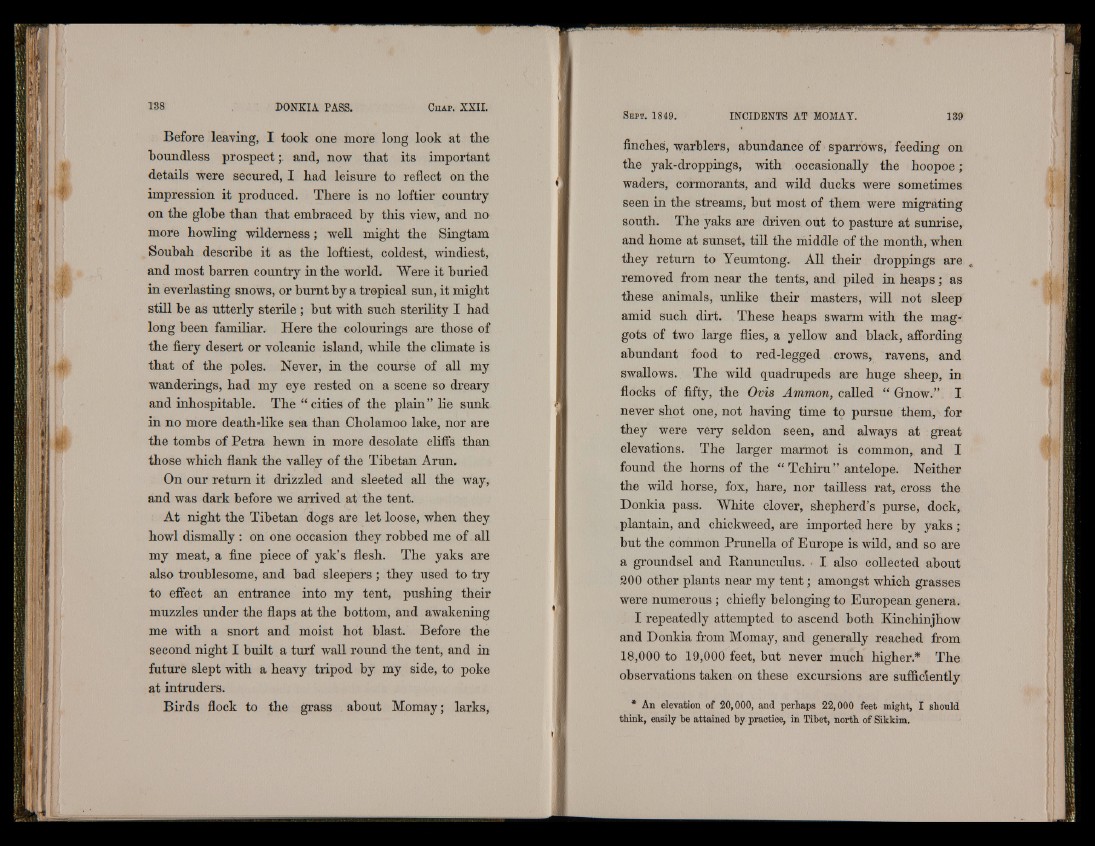
Before leaving, I took one more long look at the
boundless p r o s p e c t a n d , now that its important
details were secured, I had leisure to reflect on the
impression it produced. There is no loftier country
on the globe than that embraced by this view, and no
more howling wilderness; well might the Singtam
Soubah describe it as the loftiest, coldest, windiest,
and most barren country in the world. Were it buried
in everlasting snows, or burnt by a tropical sun, it might
still be as utterly sterile ; but with such sterility I had
long been familiar. Here the colourings are those of
the fiery desert or volcanic island, while the climate is
th a t of the poles. Never, in the course of all my
wanderings, had my eye rested on a scene so dreary
and inhospitable. The “ cities of the plain” lie sunk
in no more death-like sea than Cholamoo lake, nor are
the tombs of Petra hewn in more desolate cliffs than
those which flank the valley of the Tibetan Arun.
On our return it drizzled and sleeted all the way,
and was dark before we arrived at the tent.
At night the Tibetan dogs are let loose, when they
howl dismally : on one occasion they robbed me of all
my meat, a fine piece of yak’s flesh. The yaks are
also troublesome, and bad sleepers; they used to try
to effect an entrance into my tent, pushing their
muzzles under the flaps at the bottom, and awakening
me with a snort and moist hot blast. Before the
second night I built a turf wall round the tent, and in
future slept with a heavy tripod by my side, to poke
at intruders.
Birds flock to the grass about Momay; larks,
finches, warblers, abundance of sparrows, feeding on
the yak-droppings, with occasionally the hoopoe;
waders, cormorants, and wild ducks were sometimes
seen in the streams, but most of them were migrating
south. The yaks are driven out to pasture at sunrise,
and home at sunset, till the middle of the month, when
they return to Yeumtong. All their droppings are .
removed from near the tents, and piled in heaps; as
these animals, unlike their masters, will not sleep
amid such dirt. These heaps swarm with the maggots
of two large flies, a yellow and black, affording
abundant food to red-legged crows, ravens, and
swallows. The wild quadrupeds are huge sheep, in
flocks of fifty, the Ovis Ammon, called “ Gnow.” I
never shot one, not having time to pursue them, for
they were very seldon seen, and always at great
elevations. The larger marmot is common, and I
found the horns of the “ Tchiru” antelope. Neither
the wild horse, fox, hare, nor tailless rat, cross the
Donkia pass. White clover, shepherd’s purse, dock,
plantain, and chickweed, are imported here by yaks ;
but the common Prunella of Europe is wild, and so are
a groundsel and Ranunculus. • I also collected about
200 other plants near my te n t; amongst which grasses
were numerous ; chiefly belonging to European genera.
I repeatedly attempted to ascend both Kinchinjhow
and Donkia from Momay, and generally reached from
18,000 to 19,000 feet, but never much higher.* The
observations taken on these excursions are sufficiently
* An elevation of 20,000, and perhaps 22,000 feet might, I should
think, easily he attained by practice, in Tibet, north of Sikkim.